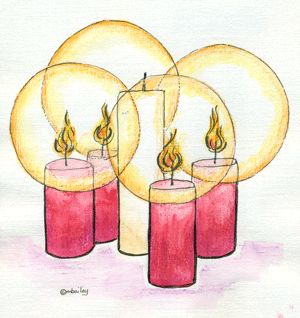ThisisChurch.com |
||
Advent

Advent is the season four weeks before Christmas in which we prepare for the coming of Christ. It begins on Sunday nearest to 30th November. Advent is the period of preparation for the celebration of the birth of Jesus and its name comes from the Latin word adventus, which means "coming".
The season also celebrates Christ's anticipated coming again in the
fullness of time to rule triumphantly over life in heaven and earth,
as well as the coming of Christ as the infant Saviour whose birth we
celebrate at Christmas. And because the season emphasizes Christ's
comings and not just his birth, it’s more than just a time to get
ready for Christmas. It is a penitential season but is no longer
associated with the strictness of Lent. Nevertheless Advent reminds us
that the question is not whether Jesus will return to judge the earth,
but when.
The season of Advent came into being toward the middle of the sixth
century. At first, the Advent Season was determined as the six Sundays
leading up to Christmas. This was then reduced to four Sundays by Pope
St. Gregory the Great (591-604).
Before the seventh century, Christmas was a secondary feast, especially in Rome, but as it came to take on more and more importance, so the season of Advent evolved in a similar manner. Advent became more solemn and its orientation changed. From just being a time to prepare for Christmas, it became a time to look to the glorious return of the Lord and now the Sunday’s of Advent reflect this double perspective of waiting for the Second Coming of Jesus (First and Second Sundays) and the immediate preparation for the feast of Christmas (Third and Fourth Sundays).
The Roman Catholic Church summarises Advent by saying, "When the Church celebrates the liturgy of Advent each year, she makes present the ancient expectancy of the Messiah, for, by sharing in the long preparation for the Saviour's first coming, the faithful renew their ardent desire for His Second Coming."
God’s first intervention within our history came not in the form of
some instant or earth shattering event, but instead God chose to come
into the world as we all do, to be born as a baby in the midst of a
chaotic world. By our own impatient standards this seems such a slow
way to bring salvation to the world. But God may not always choose the
easy answer or the quick fix. But by His earthly incarnation He
demonstrates a total commitment to the very core of humanity. A
commitment, to its day by day routines and challenges, a commitment to
humanity from the cradle to the grave and beyond. And in that same
incarnational way, God comes to us day by day, through the working of
the Spirit, through His Word and Sacrament, making the ordinary
extraordinary; making the broken whole; and redeeming and restoring
the past, present and future, whatever they hold.
This is a message which is clear in the gospel reading today. History, myth, belief and imagery come together to create a vision, the strength of which is not in trying to understand the detail of Christ’s second coming but in catching a glimpse of the message of salvation and healing being completed. We should not spend our time worrying about the timing of God’s arrival or about the distraction of what might happen in the meantime. God’s reign has already broken into our world through the incarnation, death and resurrection of Christ. His Kingdom is near and it is coming, even as it is already arrived but not fully realized. We are to remain watchful, and aware, and to be prepared for the final coming, which is likely to arrive any time that God’s love is shared with uncommon grace in a world so desperately in need of that love. It is through us, and through the very imperfect Church that bears His name that His love and grace continue to come and spread, at Advent and through the Christian year ahead as we look to His coming in glory.
There is much about Advent to enjoy, the Advent wreaths found in our churches where they have four candles to be lit each Sunday and one for Christmas Day. But in the midst of our church we know that just as we prepare for Christmas, so we have to make ready to welcome Jesus in our lives. Are you ready for the coming of Jesus?

